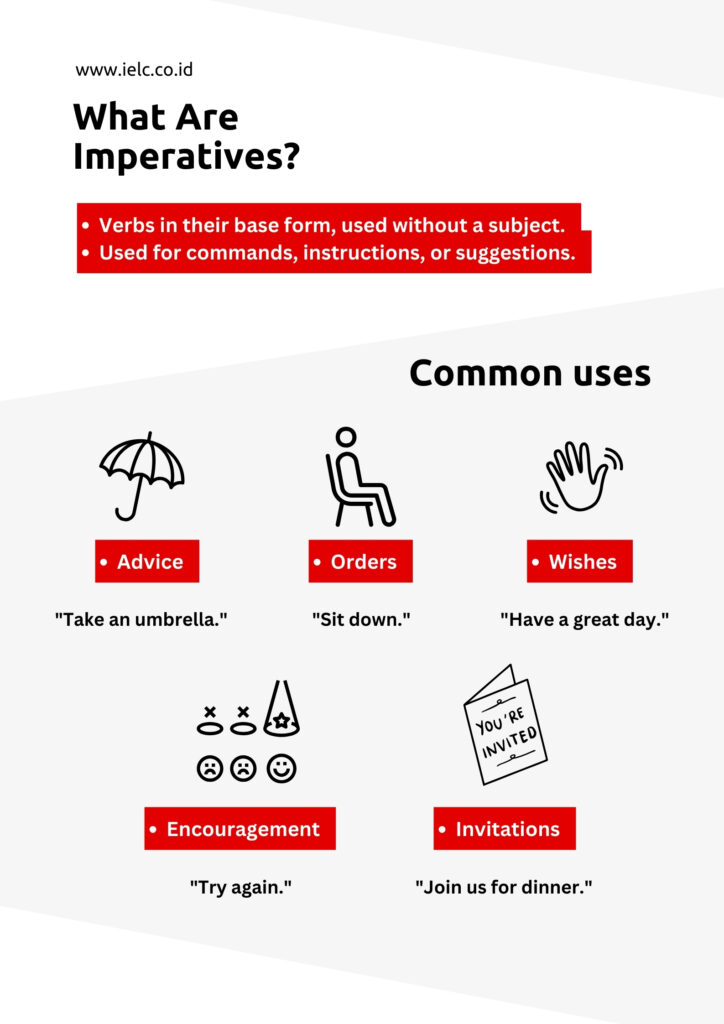
All about imperative sentences: definition, types, and examples
Welcome, learners!
Ever wondered how a simple sentence can pack a punch and make things happen?
Enter the realm of imperative sentences – those straightforward, action-oriented commands and requests that we use more often than we realize. From a casual “Close the door, please” to an urgent “Call for help!” these sentences are the power players in our daily communication toolbox!
In this lively exploration, we’re going to unravel the mysteries of imperative sentences. We’ll discover how they command attention, convey clear instructions, and sometimes, even express a heartfelt plea!
Whether you’re giving directions, making suggestions, or asking for a favor, mastering imperative sentences can elevate your communication game to a whole new level!
So, buckle up and prepare to embark on an exciting linguistic journey that will transform the way you use words to connect and interact with the world around you!

Definition
Imperatives are verbs in their base form used without a subject. This means they don’t need a pronoun like ‘you’ or ‘we’ to make sense. For example, in the sentence “Sit down,” ‘sit’ is an imperative verb, and there’s no need to say who should sit down – it’s understood from the context.
We commonly use imperatives to give commands, instructions, or suggestions. For instance, a teacher might say, “Please, open your books to page 10,” using an imperative to give an instruction. If someone says, “Pass the salt,” they are using an imperative to make a request. Imperatives are also used for giving advice or suggestions, like in “Try this new restaurant.”
In summary, imperatives are a direct and efficient way to tell someone what to do, without needing to mention who is being spoken to. They are a key part of everyday language, helping us communicate instructions, requests, and suggestions clearly and quickly.
Common uses of imperatives
- Order and instructions: Imperatives are often used to give direct orders or instructions. This is a straightforward way to tell someone what they need to do. For example, a teacher might say, “Clean your hands before lunch,” or a boss might instruct, “Read chapter 3 and then write a summary.” These sentences use imperatives to clearly state what action should be taken.
- Encouragement: Imperatives can also be used to encourage someone. Phrases like “Try again” or “Don’t give up” are common in situations where you want to motivate someone to continue their efforts or to persevere through a challenge.
- Suggestions or advice: When offering suggestions or advice, imperatives come in handy. They provide a friendly yet direct way to recommend an action. For example, “Take your umbrella, it might rain” or “Try the pizza at that restaurant, it’s delicious” are both suggestions given using imperative verbs.
- Offers and invitations: Imperatives are often used when extending an offer or an invitation. This use makes the offer or invitation sound friendly and open. Examples include, “Have a cup of coffee” when offering something to drink, or “Come to London with us” when inviting someone on a trip.
- Expressing wishes for someone’s welfare: We frequently use imperatives to express good wishes for someone. Phrases like “Enjoy your meal” or “Get well soon” are examples of using imperatives to wish someone well.
Negative form of imperatives
In addition to their standard form, imperatives can also be used in a negative form to tell someone not to do something. This is achieved by using “do not” or its contraction “don’t,” followed by the base form of the verb. This structure is straightforward but crucial for conveying a command or request in the negative.
For example, if you want to instruct someone to refrain from a specific action, you might say, “Do not touch the wet paint.” In a more casual or urgent context, you might use the contraction: “Don’t run in the hallway.” Both sentences effectively communicate a prohibition or a warning.
The negative form of imperatives is widely used in everyday language for various purposes – from enforcing rules and guidelines to ensuring safety and proper behavior. For instance, a sign in a public place might read, “Don’t litter,” clearly indicating an action that should not be taken.
In summary, the negative form of imperatives is a simple yet powerful tool in language, allowing us to express prohibitions and warnings clearly and directly!
Polite and formal imperatives
Imperatives, while direct, can sometimes come across as too blunt or commanding, especially in formal or polite contexts. To soften the tone and add a touch of courtesy, we often prepend the word “do” to the imperative verb. This small addition transforms the imperative into a more polite and formal request.
For example, instead of saying “Have a cup of coffee,” which is direct and to the point, saying “Do have a cup of coffee” adds a layer of politeness and makes the offer sound more inviting and less commanding. This form is particularly useful in situations where you want to be respectful or when you’re addressing someone in a formal setting.
Similarly, “Do come in” sounds more welcoming and less abrupt than simply saying “Come in.” The addition of “do” in these instances softens the command, making it more of a gentle suggestion or a polite invitation.
This polite form of imperatives is a key aspect of courteous communication, especially in cultures where formality and politeness are highly valued. It’s a simple yet effective way to ensure that your requests and suggestions are received in a positive and respectful manner.
Imperatives with subject pronouns
While imperatives typically don’t require a subject, there are instances where adding a subject pronoun, especially “you,” can add emphasis or a specific tone to the command. However, this usage needs to be approached with caution, as it can significantly alter the perceived tone of the sentence, often making it sound more direct, forceful, or even confrontational.
For example, consider the difference between “Wait here” and “No, you wait here.” The addition of “you” in the second sentence adds a layer of emphasis, making the instruction more personal and direct. Similarly, “Don’t tell me what to do” is a straightforward command, but “Don’t you tell me what to do” carries an added weight, potentially implying defiance or challenge.
It’s important to be mindful of the context and the relationship between the speaker and the listener when using imperatives with subject pronouns. In casual or familiar settings, this form can express strong emotions or urgency. However, in formal or sensitive situations, it might be perceived as too harsh or disrespectful!
First-person imperatives
Imperatives aren’t just for directing others; they can also include the speaker, especially when using the first-person form with ‘Let’. This form is a bit different from the typical imperative and is used to involve the speaker in the action or decision.
- Singular Form: “Let me”
When you use “Let me” followed by the base form of a verb, it’s often a way of self-instruction or expressing a personal intention or thought. For example, “Let me think” is a common phrase used when someone needs a moment to consider something. It’s a polite way of asking for a brief pause to gather thoughts.
- Plural Form: “Let us” or “Let’s”
The plural form, “Let us” or more commonly its contraction “Let’s,” is used when making suggestions that involve both the speaker and the listener. For instance, “Let’s start” is an invitation for the group, including the speaker, to begin an activity. It’s a collaborative form of the imperative, often used to propose actions, make plans, or suggest activities in a friendly and inclusive manner.
At IELC, we teach English the right way
Our goal is to get you speaking in English with fluency and confidence as fast as possible. We want to give you the skills you need to fulfil your potential!
Our experienced teachers will guide you along every step of the learning process to ensure that you are not wasting your time, money, and energy on useless language exercises & wrong methods.
Our courses
With our modern campus and technology, we are equipped to provide the best possible courses for children, teens, and adults, including:
Online and on campus IELTS courses
Online and on campus TOEFL PBT courses
Online and on campus TOEFL iBT courses
We offer our classes in group classes or private classes.
No matter what your goals are, our team will help you achieve these goals by providing you with Indonesia’s best English courses!
Talk to our team today to get your FREE consultation and take your first step towards success.
Sincerely,

IELC Academic Director
